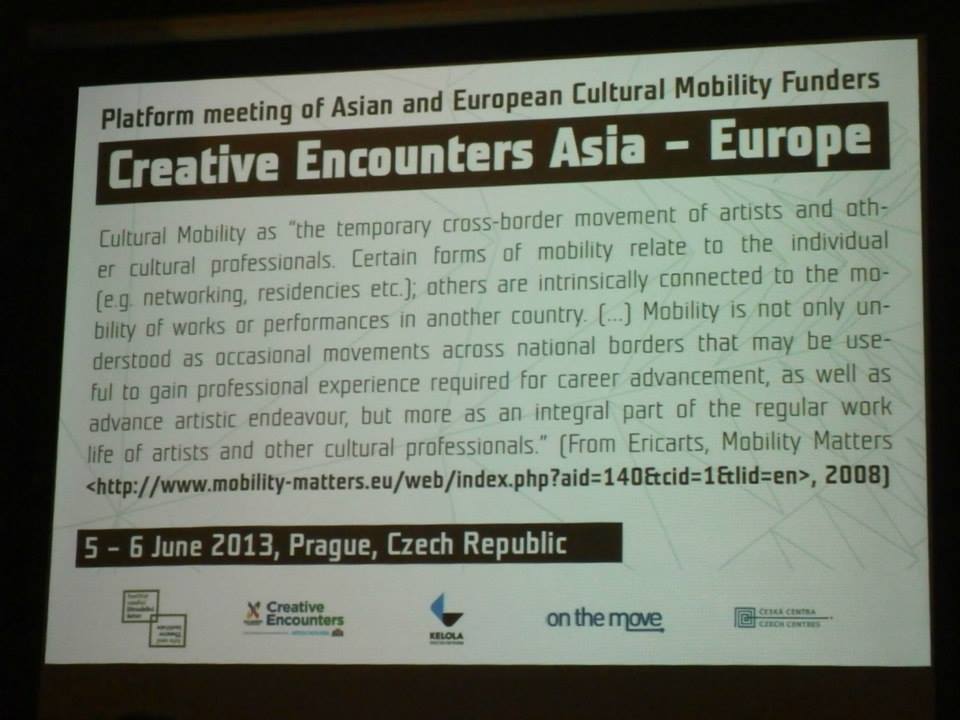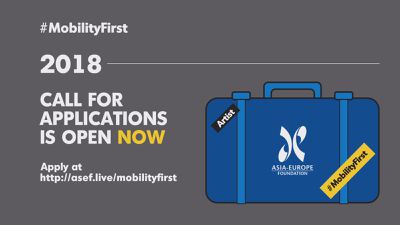By Herman Bashiron Mendolicchio
03 Jul 2013
Exchanging Visions and Experiences on Mobility. Exploring the Asia-Europe connection.

On 5 and 6 June 2013 the city of Prague hosted the Platform meeting of Asian and European Cultural Mobility Funders, as part of the second edition of the Creative Encounters funded by the Asia-Europe Foundation (ASEF) and its partners Arts Network Asia (ANA) and the European network Trans Europe Halles (TEH).
This excellent initiative, organized by Art Theatre Institute (Czech Republic), Kelola Foundation (Indonesia), and On The Move (Belgium), started with a clear and concise declaration of Petr Hnízdo, Director of International Relations Department of the Czech Ministry of Culture, who said: “I’ve just came back from the 2nd World Forum on Intercultural Dialogue in Baku, Azerbaijan, where I recognized how cultural mobility is important especially for intercultural dialogue”.
This statement - delivered in front of an audience of approximately 50 people from around 28 different European and Asian countries – pointed out a crucial point related to cultural mobility: the importance of learning from diversity and practicing intercultural dialogue.
The intensive two-days meeting, developed through different sessions, focus groups and projects presentations, highlighted the growing importance of global cultural mobility and the urgency to create an agenda to support and strengthen the Asia-European connections.
As Sophie Travers, from Australia Council for the Arts and IETM/Belgium, emphasized: “there is a growing interest in non-European markets from European projects”.
During the meeting, participants compared models, discussed different philosophies, and elaborated on the know-how of cultural mobility, with the idea of offering more accurate answers to the following questions: Why, how, and what kind of conditions are required to give support and to fund cultural mobility?
The debate and the exchange of ideas were very dynamic. Generally speaking, participants pointed out and emphasized a positive view of cultural mobility. The vast majority of them converged on the importance of mobility as a helpful instrument to connect and to create new networks, as an inspirational engine for innovation, and as a creative hub for dealing with and reimagining the world.
As Nguyen Phuong Hoa, from Ministry of Culture, Sports and Tourism of Vietnam, said: “For artists and cultural operators, exchange and mobility can help to broaden their eyes, open their minds, enrich their experiences, enhance their professional capacity and strengthen networking. It opens new opportunities and horizons”.
In the same view, some of the participants highlighted as well the social and political ingredients of mobility. Angie Cotte, from Roberto Cimetta Fund, highlighted the importance “to develop a dialogue with policymakers on funding strategies and create alliances with local authorities”. Dr. Shahidul Alam, from Chobi Mela/Bangladesh; Gemma Sharpe, from VASL/Pakistan and Arundhati Ghosh, from India Foundation for the Arts, stressed the different aspects of cultural mobility related to mediation, cross-border dialogue or the reduction of social inequalities.
Considering the above mentioned remarks, we can conclude that cultural mobility operates not only as a tool for increasing the mutual understanding between cultures, but also as a confrontational and at the same time cooperative practice that could help in peacekeeping by means of connecting territories, geographies, and narratives. Through the practice of mobility we can build new contexts from where to analyze the present and to deal with the challenges of the future. As one of the participants said, mobility can be an “antidote to cultural introspection”, that is, an important device for education and social transformation.
Many key issues were raised during the meeting, from sustainability and environmental challenges to visa rules and diplomatic conventions.
During the panels, participants explained in deep their diverse organizational strategies for funding mobility programs and shared local experiences, achievements, and failures. Beyond differences, it is important to stress here the common key findings and inputs for concrete outcomes that all the participants composed together in the last morning session of the meeting.
First of all we do have to recognize the multiple impacts of cultural mobility, not only in the artistic and cultural fields, but also from a social, political, economical and environmental point of view.
Another concept deeply discussed in the meeting was reciprocity –a good idea not always easy to materialize, but which can help to create a sustainable and ethical model for international exchange. Non-monetary exchanges could offer a valuable solution and, related with this issue, the group discussed the important role of the interface organisations.
More crucial points were addressed such as funding “quality projects”; promoting “fair exchanges”; supporting locally engaged cultural mobility instead of superficial “tourism”; establishing a more creative, transparent, and effective methods of evaluation, where to consider the whole process and not just the outputs; and finally, generating a strong advocacy policy to facilitate visa processes as well as consolidating and disseminating new narratives, studies, and researches on cultural mobility.
This first meeting of Asian and European cultural mobility funders and supporters clearly shown the growing mutual interest to organize common projects in and between the two continents on the one hand and the importance of creating a dialogue about the multiple aspects, models and visions of cultural mobility among the different stakeholders on the other.
Meetings like this help us to see the importance of creating stable networks and the need to feed our platforms with contents and give them solidity and continuity. We need to identify our common challenges and key issues in order to improve the international practice of cultural mobility and its positive impact on our life and society.
For more information about the Platform meeting of Asian and European Cultural Mobility Funders, visit:
http://on-the-move.org/about/ourownnews/article/15512/platform-meeting-of-asian-and-european-cultural/
Herman Bashiron Mendolicchio holds a European PhD in “Art History, Theory and Criticism” from the University of Barcelona.
His current lines of investigation involve the subjects of intercultural processes, globalization and mobility in contemporary art as well as the interactions between artistic, educational, media and cultural practices in contemporary society. He has participated in several international conferences and developed projects and research residencies in Europe, Asia and the Middle East. As an art critic and independent curator, he writes articles for several international magazines and is co-founder of the Platform for Contemporary Art and Thought, InterArtive (http://www.interartive.org).
Similar content
posted on
11 May 2015
posted on
05 May 2014
posted on
06 Nov 2013
posted on
18 Oct 2013
posted on
27 Mar 2018





